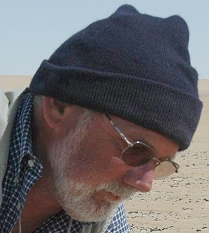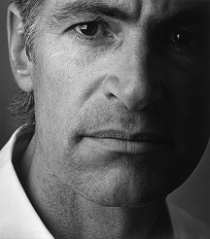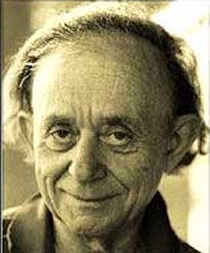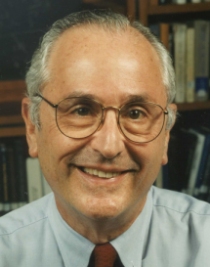|
Laureates 2003
|
 PAST - Paleoanthropology :
PAST - Paleoanthropology :
Professor MICHEL BRUNET
|

|
Directeur UMR CNRS 6046
Laboratoire de Geobiologie,
Biochronologie et Paleontologie Humaine
Faculte des Sciences Fondamentales et Appliquees
Universite de Poitiers, France
|
Michel Brunet is Professor of Vertebrate Paleontology at the
University of Poiters in south-western France, and has been working
in Chad for more than a decade. In 2002 he published in Nature,
an almost complete cranium of the oldest human ancestor: Sahelanthropus
tchadensis (nicknamed Toumai) discovered in Chad. In 1995
he described another new Chadian hominid species, Australopithecus
bahrelghazali, dated around 3.5 Ma.
In Chad, he initiated and is currently working as Head of, the
the international transdisciplinary team: M.P.F.T.(Mission Paleoanthropologique
Franco-Tchadienne) a scientific collaboration between the University
of Poitiers, N'Djamena and CNAR (N'Djamena).
Until 1995, pre-humans had only been traced in southern and eastern
Africa. This new geographical and stratigraphical distribution
pattern for early hominids emphasizes that, as opposed to previous
conceptions, the first stages of our history were pan-African,
dating back at least 6 million years. This implies an earlier
chimpanzee-human divergence (at least seven million years ago)
than previously thought.
Professor Brunet is a gifted scholar and a superb field worker,
working in the unforgiving hardness of the hot, dusty, and wind-swept
terrain, initially in southern Asia and subsequently, for over
two decades, in western and north central Africa.
His efforts at encouraging education, developing cooperation,
and the organization and pursuance of such prolonged and intensive
multidisciplinary field investigation have resulted in wholly
new and extensive documentation of geological history and attendant
extensive fossil recording of sahelian Africa during the upper
Tertiary.
These revelations and their magnitude are of major significance
for elucidation of the African natural world surrounding the initial
appearance and earliest evolution of humankind, whose oldest know
representatives are found there. These remarkable discoveries
cast human origins in a very new perspective. They have, and will,
profoundly impact the pursuit of human evolutionary studies for
decades to come.
Professor Brunet was born in 1940 in Vienne, France, and received
a Bachelor's degree in Life Science, Licence es Sciences de Doctorat,
and Ph.D. in Paleontology from the University of Paris. He obtained
his D.Sc. in Life Science from the University of Poitiers.
|
 PRESENT - Print & Electronic Media:
PRESENT - Print & Electronic Media:
|
Mr. JAMES NACHTWEY

James Nachtwey is no ordinary photojournalist. He has dedicated
his life to documenting the apocalyptic events of our time: war,
famine, man's inhumanity to man, the plight of the disenfranchised
all over the world. With eye of an artist and the instincts of
a journalist, he creates images that are both appalling and profound.
His photographs may not be easy to look at but they are impossible
to ignore.
This is Nachtwey's goal: to burden viewers with such an uncomfortable
awareness that it will force them to seek justice and change.
He says, "I have been a witness, and these pictures are my
testimony. The events I have recorded should not be forgotten
and must not be repeated." His photographs on AIDS in Africa
were published in Time magazine and were shown in the U.S.
Congress; they helped lead to legislation requiring drug companies
to provide cheaper generic drugs to fight the disease.
James Nachtwey's work is astonishing in its diversity, its beauty
and in the electrical charge of Nachtwey's commitment to making
incredible images even in the face of tremendous personal danger.
He is an inspiration not only to photojournalists but to people
everywhere.
James Nachtwey grew up in Massachusetts and graduated cum
laude from Dartmouth College, where he studied art history
and political science. Images fro the Vietnam war and the American
Civil Rights movement had a powerful effect on him and were instrumental
in his decision to become a photographer.
Nachtwey has devoted himself to documenting wars, conflicts and
critical social issues. He has worked on extensive photographic
essays in El Salvador, Nicaragua, Guatemala, Lebanon, the West
Bank and Gaza, Israel, Indonesia, Thailand, India, Sri Lanka,
Afghanistan, the Philippines, South Korea, Somalia, Sudan, Rwanda,
South Africa, Russia, Bosnia, Chechnya, Kosovo, Romania, Brazil
and the United States.
James Nachtwey has been a contract photographer with Time magazine
since 1984. He has received numerous honors and awards. James
Nachtwey is a fellow of the Royal Photographic society and has
an Honorary Doctorate of Fine Arts from the Massachusetts College
of Art.
|
Mr. FREDERICK WISEMAN

Fredereck Wiseman is widely acclaimed as the most important person
ever to lift a camera for documentary filmmaking. His first film,
1967's Titicut Follies, remade the whole genre of nonfiction film,
introducing path-breaking innovations such as the lack of a narrator,
a spare and honest cinematography and a narrative line that resembled
a Hollywood film in its dramatic development, even though the
story was entirely true. He has influenced thousands of film directors
and producers.
If the artist's gift for storytelling is what brings viewers
into his films and keeps them there, what devastates them is the
fact that what they are watching is true. In 32 nonfiction films,
Wiseman has tackled subjects such as education for the disabled,
the view of America from abroad, and most notable, the criminal
justice system. Two of his films, High School and Welfare, have
been designated National Treasures by the U.S. Library of Congress.
In all of his work, Wiseman makes us reckon with our emotions,
the cost to society of marginalizing those who cannot speak for
themselves.
Fredereck Wiseman received his B.A. from Williams College and
his LL.B. from Yale Law School. He holds many honorary doctorates
and fellowships, among them from the American Academy of Arts
and Letters, and the American Academy of Arts and Sciences. Wiseman
has received numerous awards, including the following: the Mannheim
International Film Week, the Emy Award, the USA Film Festival,
the Peabody Award, The Berlin International Film Festival, and
the HOT DOCS award.
|
 FUTURE - Cosmology & Astronomy
FUTURE - Cosmology & Astronomy
Professor JOHN BAHCALL

John Bahcall has made fundamental and lasting contributions to
an astonishing number of different areas of modern astrophysics,
ranging from the interpretation of quasar absorption lines to
the first detection of a neutron star companion. This work culminates
in his contributions to neutrino astronomy and to the solar neutrino
problem. The solar neutrino observations revealed conclusively
that the sun emits neutrinos in amazing agreement with theoretical
prediction.
Neutrino astrophysics is part of a new field of research that
nowadays is called "Particle Astrophysics". Bahcall
contributed crucially towards the development of this field, which
holds great promise for the future, particularly for cosmology.
For example, the mysterious non-baryonic "dark matter",
which forms some ninety per cent of the gravitating matter in
the universe and plays an essential role in the formation of the
observed structures in the universe (galaxies, clusters and super-clusters
of galaxies) is expected to be composed of new types of elementary
particles, whose nature is still to be discovered.
John Bahcall is Richard Black Professor of Natural Sciences at
the Institute of Advanced Study, Princeton, N.J., U.S.A., and
has received Honorary Doctorates of Science from Ohio State University,
the University of Pennsylvania, the University of Chicago, the
University of Notre Dame and the Hebrew University. Among the
numerous awards he has received, are the U.S. National Medal of
Science, the Benjamin Franklin Medal, the Russell Prize of the
American Astronomical Society, Award Medal of the University of
Helsinki, the Dannie Heineman Prize of the American Institute
of Physics, the NASA Distinguished Public Service Medal, and the
Warner Prize American Astronomical Society.
Professor Bahcall has held many positions of Chair, among them
with the National Academy of Sciences, the U.S. National Committee
of the International Astronomical Union and the National Underground
Science Laboratory Committee.
|
 |
|